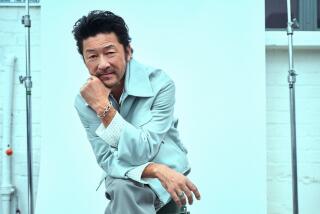PRIVATE LIVES: HOME ENTERTAINMENT, FAMILY ACTIVITIES : VIDEO : ‘The Street Fighter’ Scratches a Niche : Japanese action star Sonny Chiba is coming to America, and he’s bringing blood and gore with him.
- Share via
Are you ready for “6-foot-6 of half-breed fury and a man who keeps his word”? New Line Home Video thinks so, and on Tuesday, it will unleash Sonny Chiba on a pulped-up America.
“The Street Fighter,” the 1975 film that secured the Japanese action star’s reputation as “the ultimate movie badass,” makes its major-label debut in a first-ever unrated, authorized version. It has been remastered and will be presented complete and uncut in all its eye-gouging, testicle-ripping, skull-pounding glory (an R-rated version has also been created for more sensitive retailers).
For the record:
12:00 a.m. Feb. 4, 1996 FOR THE RECORD
Los Angeles Times Sunday February 4, 1996 Home Edition Calendar Page 83 Calendar Desk 1 inches; 25 words Type of Material: Correction
Sonny Chiba--In last Sunday’s video article by Donald Liebenson, Sonny Chiba was pictured on the right, not the left. Also, his real name should have been given as Chiba Shinichi.
A letterboxed version will retail for $19.98, a full-frame version for $9.98. New Line will also release “The Return of the Street Fighter,” “The Street Fighter’s Last Revenge” and “Sister Street Fighter” for $9.98 each. A four-volume boxed set that includes a limited-edition replica of the original “Street Fighter” poster will be available for $39.98.
New Line Chairman Robert Shaye recalled that his walking out of a bad Brazilian film at the Cannes Film Festival 25 years ago led to his chance discovery of Chiba. In the company of director Werner Herzog, Shaye came upon a screening of “The Big Boss,” Bruce Lee’s first film. Noting the ecstatic audience reaction, he rushed to buy it and another Lee film, but the deal fell through when the producer wanted a $50,000 advance from the then-fledgling company.
A few years later, yakuza [define?] films were the next big thing. Having missed out on the kung fu craze, Shaye was determined not to miss this niche opportunity and ensconced himself in a dusty screening room in Japan.
“I had to sit through about 50 yakuza films with a woman translator who would giggle during the translations of the witty or off-color stuff,” Shaye said. “There wasn’t anything potentially worthy, but there was a poster in the hallway for this karate movie starring ChibaSimichi. They screened the film for us and it was pretty far out. I think of myself as relatively sensitive, but the fact that he went that extra step to really lay people out cold was done with such elan I couldn’t help but laugh.”
It was Shaye who gave Simichi the name Sonny Chiba and came up with the “6-foot-6” line. It was not until meeting Chiba for the first time at Cannes 10 years later that Shaye discovered his star was only about 5-foot-6.
Chiba is a cult favorite among aficionados of martial arts films, but beyond them, New Line has targeted a potent new audience for this hard-boiled antihero--devotees of ‘70s pop culture and, specifically, disciples of modern-day hipster saint Quentin Tarantino.
“It’s Quentin’s kind of stuff,” Shaye said. “[Sonny Chiba films] are a small but poignant bond we share together.”
Quentinistas no doubt remember that in the Tarantino-scripted “True Romance,” Christian Slater’s character attended a Sonny Chiba triple feature on his birthday. Tarantino himself has supplied New Line with a blurb for the video box: “It’s been a long time coming. I speak for all my friends when I say thank God the wait is over.”
The wait was complicated by the sheer logistics of locating suitable materials to bring to the marketplace, explained New Line Home Video Executive Vice President Michael Karaffa. A worldwide search turned up masters outside of Kobe, Japan.
“Then the earthquake hit,” Karaffa said. “This is emblematic of the challenges we faced in getting this series out on video.”
Another challenge is name recognition. Although Chiba was once marketed as the successor to Bruce Lee, he does not enjoy the myth and celebrity of the martial arts icon. Of Chiba’s many films, including “Bushido Blade,” “The Killing Machine” and the all-star extravaganza “Virus” (with Chuck Connors and George Kennedy), most are not widely known to mainstream audiences, are not readily accessible on video or have been pulled from the market.
Chiba has resurfaced occasionally, most recently in “Aces: Iron Eagle III” and the direct-to-video “Immortal Combat” starring Roddy Piper.
But it is the “Street Fighter” films that secured his cult status, and New Line Home Video has deemed this to be the optimum time to reintroduce Chiba to the marketplace. If there is a new wave of interest in Asian action cinema, New Line vows not to miss the boat again--and this time to pilot it. Chiba hits video stores in advance of the studio’s Feb. 23 theatrical release of “Rumble in the Bronx,” starring another martial arts legend, Jackie Chan, in his long-overdue bid for Hollywood stardom.
Karaffa, too, plays the Tarantino card: “ ‘Pulp Fiction’ fans will find this action very much to their liking. It is certainly different from the ballet of Bruce Lee.”
That is an understatement. In its day, “Street Fighter” was the first film to be slapped with an X-rating for violence and not sex.
“His films are more about power and brute force,” said Frank Sanchez, co-manager of New York-based Far East Flicks. “It’s not about honor. It’s about ‘I’m going to kill you.’ ”
Not that Terry Tsuguri, Chiba’s “Street Fighter” character, doesn’t have a code by which he lives. “I despise people who don’t keep their promises,” he snarls before sending his target through the window. When he decides to take arms (his own) against the yakuza, he growls, “I hate punks worse than anything, and I want to see the mob destroyed.”
Before his staggering triumph over what the film’s original press kit called “evil of the evilest kind,” Chiba dispatches an army of assailants crudely but effectively. He single-handedly emasculates a would-be rapist. He gouges out another assailant’s eyes. For the grand finale, he rips out his nemesis’ throat (incredibly, this character returns with a voice box in “Return of the Street Fighter”).
“Outrageous, nuts,” is how Joey O’Brien, a film writer who specializes in martial arts and exploitation films, describes Chiba’s--for want of a better word--appeal. “Bruce Lee had an honorable quality about him, but Sonny has none of that. You never quite know what he is going to do. He is so savage when he fights. Steven Seagal wouldn’t make movies like this. They’re politically incorrect, but damned entertaining.”*
More to Read
The biggest entertainment stories
Get our big stories about Hollywood, film, television, music, arts, culture and more right in your inbox as soon as they publish.
You may occasionally receive promotional content from the Los Angeles Times.










